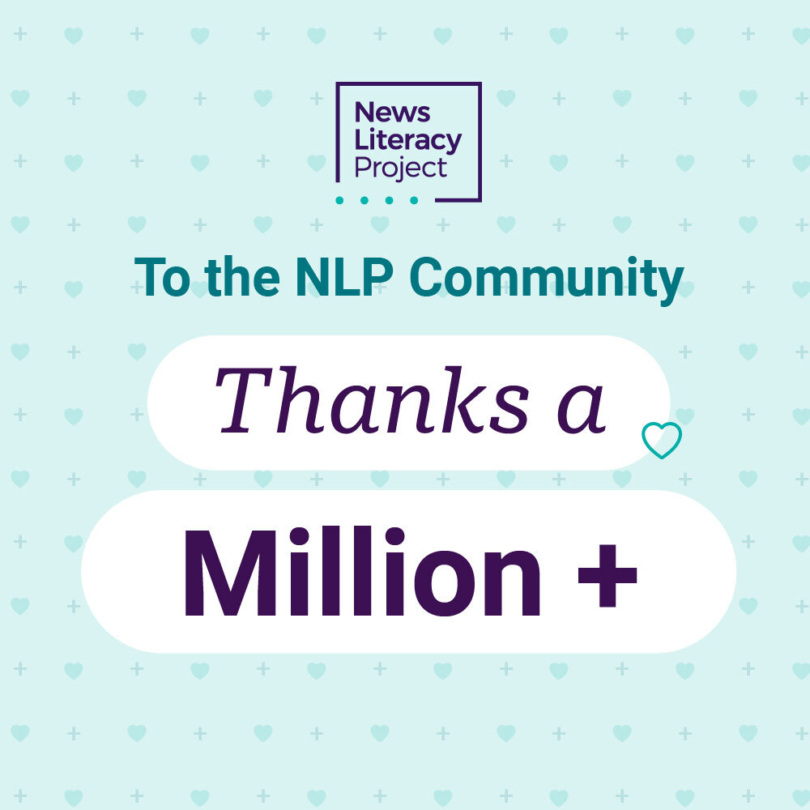Miami educators: NewsLitCamp® with Univision
Join the News Literacy Project (NLP), Univision News and Miami-Dade County Public Schools for a highly engaging, teacher-centered NewsLitCamp featuring breakout sessions with Univision News journalists.
Register today at this link (it’s FREE!) to reserve your seat: http://bit.ly/registermiamiNLC. Space is limited.
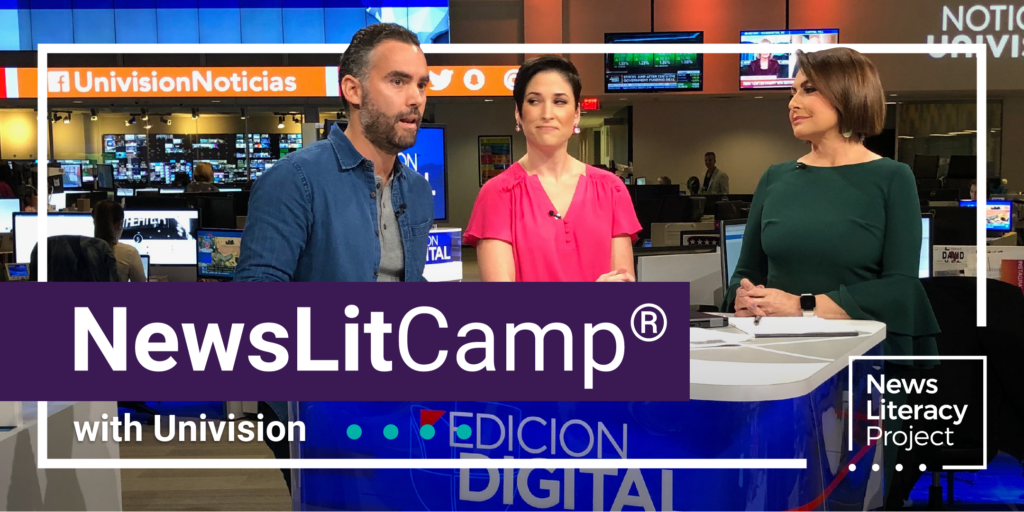
Details
Educators will meet at Univision for a full day of free workshops and conversations with NLP staff and Univision News reporters and editors. Breakfast and lunch will be provided.
About NewsLitCamp
NewsLitCamp is a day-long professional development workshop primarily for middle school and high school educators. Using an “edcamp”-style of continuing education, it features topical sessions (developed with input from attending teachers) in the morning and open-ended, educator-driven planning and development time in the afternoon. This format gives education professionals an opportunity to come together in the engaging, fast-paced environment of a news organization for a day of news literacy training and conversations with journalists and NLP‘s in-house experts.
Why attend?
NLP created NewsLitCamps to help educators improve their own news literacy skills, introduce them to resources for teaching news literacy and get their ideas and input for new resources. Participants will leave with new ideas, skills and resources to help their students navigate today’s complex information landscape and beat back a rising tide of misinformation. We also want to encourage a greater understanding between journalists and educators that enhances the appreciation of the vital civic role each has in our democracy.
Who can attend
NewsLitCamps are designed primarily for middle school and high school teachers and librarians. Space permitting, we welcome other educators and school administrators. Miami-Dade County Public School educators will receive continuing education credits for their participation (see the course titled “News Literacy” in “My Learning Plan” on the M-DCPS portal).
Bonus: Attendees will learn about NLP’s Checkology® virtual classroom, a cutting-edge comprehensive e-learning platform that complements educators’ lesson plans.
Its 13 lessons examine a variety of topics related to news literacy, including:
- The standards of quality journalism and their use in determining the credibility of information.
- Digital forensics and the varied types of misinformation.
- Watchdog journalism and its contributions to democracy.
- Press freedoms around the world.
- The evaluation of bias in news and other information.
- The importance of using accurate and truthful evidence when making arguments.
About Univision Communications Inc.
Univision is the leading media company serving Hispanic America. The company’s broadcast assets include Univision Network, one of the top television networks in the U.S. regardless of language and the most-watched Spanish-language broadcast network in the country; Univision Local Media, which owns and/or operates 64 television stations and 58 radio stations in major U.S. Hispanic markets and Puerto Rico; and Univision.com, the most-visited Spanish-language website among U.S. Hispanics. The award-winning news division of Univision Communications Inc. is committed to informing the country’s fastest-growing segment across all media platforms. Hispanics count on the latest and most relevant content that impacts the community through Noticiero Univision, the network’s evening, late evening and weekend national newscast; the Sunday public affairs program Al Punto (To The Point); newsmagazine shows Aquí y Ahora (Here and Now) and Primer Impacto (First Impact); as well as morning news segments on Despierta América (Wake Up America). Univision News has strengthened its news team and expanded its operations by adding investigative, documentary, infographics and data journalism units.
Charlotte educators: NewsLitCamp® with The Charlotte Observer
Join the News Literacy Project (NLP), The Charlotte Observer and Charlotte-Mecklenburg Public Schools for a highly engaging, teacher-centered NewsLitCamp featuring breakout sessions with Charlotte Observer journalists.
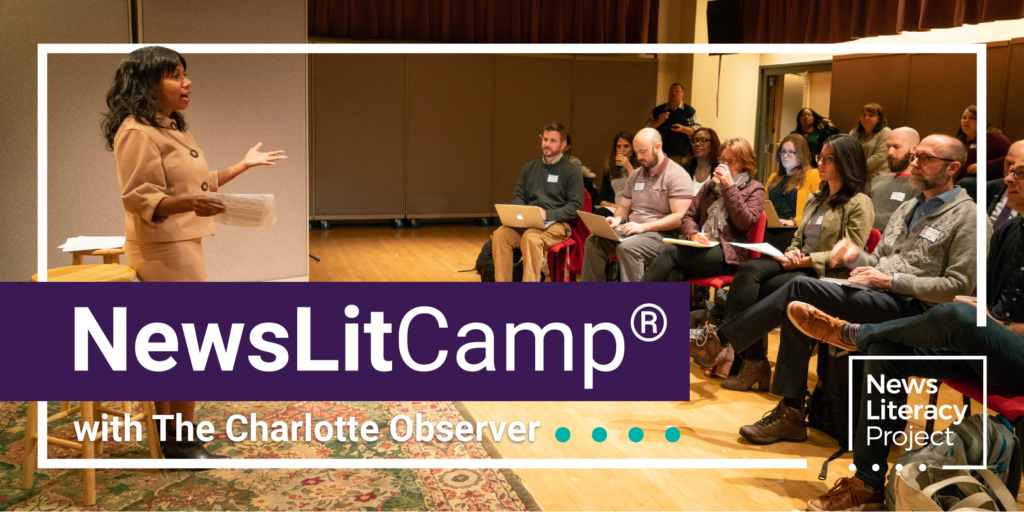
Details
Educators will meet at The Charlotte Observer for a full day of free workshops, conversations and maker sessions with NLP staff and Observer reporters and editors. Breakfast and lunch will be provided.
About NewsLitCamp
NewsLitCamp is a day-long professional development workshop primarily for middle school and high school educators. Using a hybridized approach to “edcamp”-style continuing education, it features topical sessions (developed with input from attending teachers) in the morning and open-ended, educator-driven planning and development time in the afternoon. This format gives education professionals an opportunity to come together in the engaging, fast-paced environment of a news organization for a day of news literacy training and conversations with journalists and NLP staff.
Why attend?
NLP created NewsLitCamps to help educators improve their own news literacy skills, introduce them to resources for teaching news literacy, and get their ideas and input for new resources. Educators will leave with new ideas, skills and resources to help their students navigate today’s complex information landscape and beat back a rising tide of misinformation. We also want to encourage a greater understanding between journalists and teachers — including an appreciation of the realities that both face in playing a vital civic role with increasingly scarce resources.
Who can attend
NewsLitCamps are designed primarily for middle school and high school teachers and librarians. Space permitting, we also welcome other educators and school administrators. Charlotte-Mecklenburg Schools educators will receive one full continuing education unit credit for their participation (details provided after registration).
Bonus: Participants will learn about NLP’s Checkology® virtual classroom, a comprehensive news literacy e-learning hub that complements educators’ lesson plans.
Lesson topics include:
- The standards of quality journalism and their use in determining the credibility of information.
- Digital forensics and the varied types of misinformation.
- Watchdog journalism and its contributions to democracy.
- Press freedoms around the world.
- The evaluation of bias in news and other information.
- The importance of using accurate and truthful evidence when making arguments.
- The role of personalization algorithms in the creation of filter bubbles.
About The Charlotte Observer
Since 1886, The Charlotte Observer has been dedicated to serving Charlotte and its surrounding region with strong, independent journalism and a mission to report clearly, truthfully and completely. The Observer is the largest-circulating newspaper in North Carolina and the most visited news and information website in the Carolinas. Its staff has won four Pulitzer Prizes, including two Gold Medals for Public Service. #Readlocal
Educators in Chicago or attending #NCSS18: NewsLitCamp® at WBEZ
Join the News Literacy Project (NLP), WBEZ and the National Council for the Social Studies (NCSS) for a NewsLitCamp on Thursday, Nov. 29, from 8 a.m. to 3 p.m.
WBEZ (91.5 FM) is Chicago’s NPR affiliate; it also produces This American Life and co-produces, with NPR, the popular current affairs quiz show Wait Wait … Don’t Tell Me! NCSS is a professional association that provides leadership, service and support to social studies educators; its annual conference, in Chicago, begins Nov. 30.
NewsLitCamp is a hybridized approach to “edcamp”-style professional development, with topical sessions (developed with input from teachers) in the morning and an open-ended, teacher-suggested workshop schedule in the afternoon. For this NewsLitCamp, offered as an NCSS pre-conference clinic, educators will meet at WBEZ for a full day of workshops, conversations and maker sessions with NLP staff, NLP ambassador educators and WBEZ reporters and editors.
This NewsLitCamp is open to both educators attending NCSS and Chicago-area educators. Registration is free; space is limited. Breakfast and lunch will be provided.
Why should educators attend? NLP created NewsLitCamps to help middle school and high school educators improve their own news literacy skills, introduce them to resources for teaching news literacy and get their ideas and input for new resources. We also want to encourage a greater understanding between journalists and teachers — including an appreciation of the realities each face in playing a vital civic role on the front lines of the country’s democracy.
Bonus: Participants will learn about NLP’s Checkology® virtual classroom, a comprehensive news literacy e-learning hub that complements educators’ lesson plans. Lesson topics include:
- The standards of quality journalism and their use in determining the credibility of information.
- The history of watchdog journalism and its contributions to democracy.
- The evaluation of bias in news and other information.
- The differences in press freedoms around the world.
- The importance of using fact-based evidence when making arguments.
- The role of personalization algorithms in the creation of filter bubbles.
Questions? Email Peter Adams, NLP’s senior vice president of education, at [email protected].
American Public Health Association annual meeting
NLP has long described the misinformation and disinformation epidemic as “a public health crisis.” Now it’s a topic of discussion at the American Public Health Association’s annual meeting. Alan C. Miller, our founder and CEO, will be joined by experts from the RAND Corporation and the Center for Media Literacy to discuss “Facts Matter: Truth, Media and Public Health.”
News literacy sessions in Brazil
Christine Nyirjesy Bragale, NLP’s senior vice president of communications, is taking the news literacy message to Brazil this week. Between Nov. 6 and Nov. 13 she will be leading discussions on media literacy and information disorder, open to the public, in Manaus, Brasília and Sāo Paulo; she will also meet with students, educators and journalists.
Bragale’s visit is sponsored by the U.S. Embassy and several Brazilian educational institutions and news outlets.
National Association of Science Writers — 2018 meeting
These days, communicating with young people about science is critical — especially when the phrase “fake news” is often applied to scientific topics. Today’s tweens and teens are the next generation of voters; some could be casting their first ballots as soon as next month. To make good decisions, they will need both science literacy and media literacy — the ability to judge a report’s credibility and authenticity.
NLP’s director of partnerships, Damaso Reyes, is joining science writers and editors at ScienceWriters2018 — the annual meeting of the National Association of Science Writers — for a panel on Saturday, Oct. 13, titled “Talking with young people about science in the age of #fakenews.” Panelists will share insights and experience from diverse areas that include news literacy training, public engagement and outreach, and science journalism for middle school and high school students.
L.A. area educators: NewsLitCamp® at UCLA
Join the News Literacy Project and the Los Angeles Times for a highly engaging (and free!) teacher-centered NewsLitCamp — a professional development event featuring breakout sessions with L.A. Times journalists.
The Los Angeles Times has been covering the city, the region and the world for more than 136 years. It has won 44 Pulitzer Prizes in a variety of categories (24 in the last 20 years alone), including six gold medals for public service — the most recent in 2011 for its reports on corruption in the city of Bell.
NewsLitCamp is a hybridized approach to “edcamp”-style professional development, with topical sessions (developed with input from teachers) in the morning and an open-ended, teacher-suggested workshop schedule in the afternoon. For this NewsLitCamp, middle school and high school educators will meet at UCLA for news literacy training and conversations with NLP staff and Los Angeles Times journalists.
Register (it’s free!) here. Space is limited.
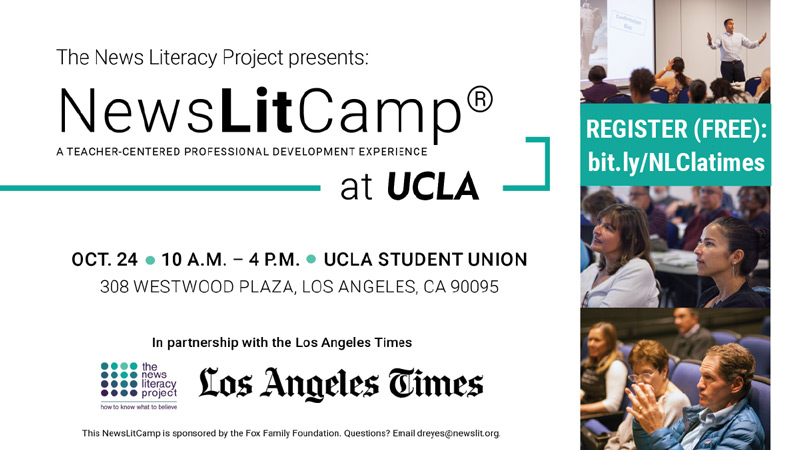
Why should I attend? NLP created NewsLitCamps to help educators improve their own news literacy skills, introduce them to resources for teaching news literacy and get their ideas and input for new resources. We also want to encourage a greater understanding between journalists and teachers — including an appreciation of the realities each face in playing a vital civic role on the front lines of the country’s democracy.
LAUSD educators will receive professional development credits.
Bonus: Participants will learn about NLP’s Checkology® virtual classroom, a comprehensive news literacy e-learning hub that complements educators’ lesson plans. The platform includes lessons on:
- The standards of quality journalism and their use in determining the credibility of information.
- The history of watchdog journalism and its contributions to democracy.
- The evaluation of bias in news and other information.
- The differences in press freedoms around the world.
- The importance of using fact-based evidence when making arguments.
- The role of personalization algorithms in the creation of filter bubbles.
This NewsLitCamp is presented by the News Literacy Project and UCLA and is sponsored by the Fox Foundation.
Questions? Email Damaso Reyes, NLP’s director of partnerships, at [email protected].
Houston area educators: NewsLitCamp® at the Chronicle
Join the News Literacy Project, the Houston Chronicle and the Houston Independent School District (HISD) on Friday, Nov. 9, for a highly engaging (and free!) teacher-centered NewsLitCamp — a professional development event featuring breakout sessions with Chronicle journalists.
The Houston Chronicle, founded in 1901, is one of the largest newspapers in the United States. It was a Pulitzer Prize finalist in the public service and editorial writing categories in 2017 and in the breaking news category (for Hurricane Harvey coverage) in 2018; columnist Lisa Falkenberg won the Pulitzer Prize for Commentary in 2015.
NewsLitCamp is a hybridized approach to “edcamp”-style professional development, with topical sessions (developed with input from teachers) in the morning and an open-ended, teacher-suggested workshop schedule in the afternoon. For this NewsLitCamp, middle school and high school educators will meet at the Houston Chronicle for news literacy training and conversations with NLP staff and journalists from the Chronicle.
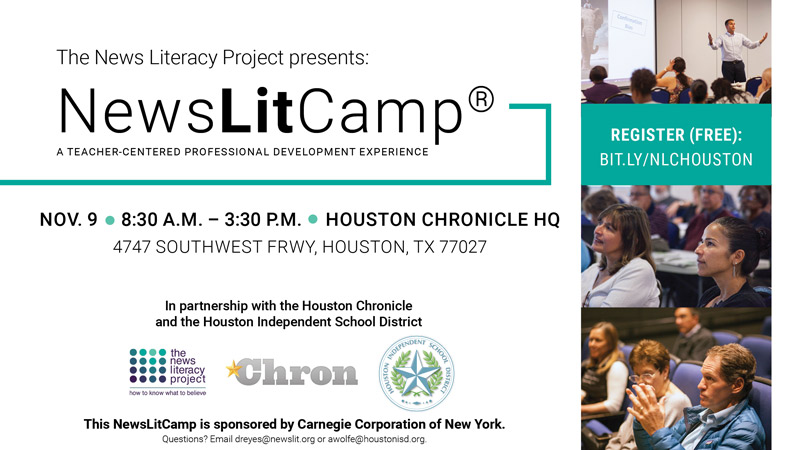
Register (it’s free!) here. Space is limited.
Why should educators attend? NLP created NewsLitCamps to help educators improve their own news literacy skills, introduce them to resources for teaching news literacy and get their ideas and input for new resources. We also want to encourage a greater understanding between journalists and teachers — including an appreciation of the realities each face in playing a vital civic role on the front lines of the country’s democracy.
Bonus: Participants will learn about NLP’s Checkology® virtual classroom, a comprehensive news literacy e-learning hub that complements educators’ lesson plans. Lesson topics include:
- The standards of quality journalism and their use in determining the credibility of information.
- The history of watchdog journalism and its contributions to democracy.
- The evaluation of bias in news and other information.
- The differences in press freedoms around the world.
- The importance of using fact-based evidence when making arguments.
- The role of personalization algorithms in the creation of filter bubbles.
This NewsLitCamp is sponsored by Carnegie Corporation of New York.
Questions? Email Damaso Reyes, NLP’s director of partnerships, at [email protected] or Annie Wolfe, HISD secondary curriculum and development officer, at [email protected].
Association for Middle Level Education – 2018 conference
John Silva, NBCT, our director of education, is presenting a session at the 2018 conference of the Association of Middle Level Education (AMLE), which describes itself as “the most valuable and comprehensive professional development opportunity in the world for any person working with students ages 10–15.”
John’s topic: “Creating a Classroom Where Facts Prevail and Students Become Critical Consumers of News and Information.” NLP will also have a booth at the conference, which runs from Oct. 25 to Oct. 27.
Educators: Sign up for our online professional development series
Is one of your goals as a teacher to help your students make sense of the torrent of news and other information streaming through their online worlds?
Would you like to empower your students by providing them with the news literacy skills they need to become active and engaged participants in civic life?
Our online professional development sessions are for you!
Teaching News Literacy is an affordable series of four online workshops that meet these needs. Led by Peter Adams, NLP’s senior vice president of education, and John Silva, a National Board Certified Teacher and NLP’s director of education, these workshops will give you everything you need to begin introducing news literacy into your classroom, including dozens of ideas, examples and tools to jump-start your news literacy instruction.
You can register for one, some or all of the sessions here ($10 per session/$30 for all four).
Session 1 – An introduction to news literacy education: This session makes the case for news literacy as a vital 21st-century skill and provides an overview of concepts and tools. We’ll put news literacy instruction in context and demonstrate how to integrate it into your classroom, using timely events and examples. We’ll also introduce important concepts and skills: how information gets filtered, how journalists decide if an event or issue is newsworthy, how the First Amendment and the watchdog role of the press play important roles in our democracy, how to evaluate bias in the news media, how to detect and debunk viral rumors, and how to analyze branded content. Tuesday, Aug. 28 (5 to 6 p.m. ET)
Session 2 – Exploring the misinformation landscape: Learn how to teach students about “fake news” and the many other forms of misleading, inaccurate and outright false information that they encounter every day. We’ll tackle the misinformation landscape: why it’s important to teach students about it, and how to use examples of misinformation to engage students in news literacy and civic learning. We’ll also discuss the authentic civic pathways and actions made available to students through studying misinformation; introduce the concept of “digital forensics” (skills and tools that can help students debunk manipulated and false images); and examine the ways that producers of misinformation are likely to exploit technological advances in the near future. Wednesday, Sept. 12 (5 to 6 p.m. ET)
Session 3 – Using news literacy to drive civic engagement: Consuming, engaging with, sharing and creating information are the most fundamental and common civic actions that anyone can take. This session will explore how news literacy learning can ignite civic engagement and improve civic literacy and reasoning. We’ll look at the connection between news literacy and civics by examining the vital role that information plays in the national conversation and discussing the opportunities for meaningful civic engagement that today’s information landscape offers. Finally, we’ll provide tips, ideas and strategies for using news literacy to supercharge a “consume/engage/create” cycle around timely civic issues. Thursday, Sept. 27 (5 to 6 p.m. ET)
Session 4 – Using digital forensics to drive news literacy learning: This session will primarily focus on applying key digital forensics skills to student activities and engaged learning. Tuesday, Oct. 9 (5 to 6 p.m. ET)
D.C. area educators: NewsLitCamp® at Bloomberg BNA
Join the News Literacy Project (NLP), Bloomberg BNA and Arlington (Virginia) Public Schools on Tuesday, Aug. 28, for a highly engaging, teacher-centered NewsLitCamp featuring breakout sessions with Bloomberg BNA journalists. This professional development event will be held at Bloomberg BNA’s headquarters in Crystal City (1801 S. Bell St., Arlington, VA 22202) from 9:30 a.m. to 3:30 p.m.
NLP empowers educators to provide students with the skills they need to become smart, active consumers of news and other information and engaged, informed participants in the civic life of their communities. Bloomberg BNA — an affiliate of Bloomberg LP, one of the world’s leading financial news organizations — provides news and analysis to legal, tax, compliance, government affairs and government contracting professionals.
Register (it’s free!) here. Space is limited.
About NewsLitCamp: NewsLitCamp is a hybridized approach to “edcamp”-style professional development, with topical sessions (developed with input from teachers) in the morning and an open-ended, teacher-suggested workshop schedule in the afternoon. For this NewsLitCamp, middle school and high school educators will come together at Bloomberg BNA in Arlington for news literacy training and conversations with NLP staff and journalists from Bloomberg BNA.
Why should I attend? NLP created NewsLitCamps to help educators improve their own news literacy skills, introduce them to resources for teaching news literacy and get their ideas and input for new resources. We also want to encourage a greater understanding between journalists and teachers — including an appreciation of the realities each face in playing a vital civic role on the front lines of the country’s democracy.
Bonus: Participants will learn about NLP’s Checkology® virtual classroom, a comprehensive news literacy e-learning hub that complements educators’ lesson plans. Lesson topics include:
- The standards of quality journalism and their use in determining the credibility of information.
- Watchdog journalism and its contributions to democracy.
- The evaluation of bias in news and information.
- The differences in press freedoms around the world.
- The importance of using accurate and truthful evidence when making arguments.
- The role of personalization algorithms in the creation of filter bubbles.
This NewsLitCamp is presented by the News Literacy Project and is sponsored by The Morris & Gwendolyn Cafritz Foundation and The Resilience Fund.
Questions? Email Damaso Reyes, NLP’s director of partnerships, at [email protected] or Cathy Bonneville Hix, social studies supervisor at Arlington Public Schools, at [email protected].
Kiwanis Capital District Convention
Kiwanis is holding its 100th Annual Capital District Convention on Aug. 17, 18 and 19 at the Hyatt Regency Reston in Reston, Virginia, and NLP will be there.
Damaso Reyes, NLP’s director of partnerships, will deliver the keynote address during the Fellowship Luncheon on Saturday, Aug. 18. His topic: “Fighting Fake News: How we can educate young people and defend democracy.” He also is leading a workshop on “Teaching News Literacy: New threats, new strategies, new tools” at 2 p.m. on Saturday.
The Kiwanis Club of Washington, D.C., has supported NLP’s work since 2014.
To learn more about the News Literacy Project, visit us at booth 1106. For more information, email Damaso at [email protected].
